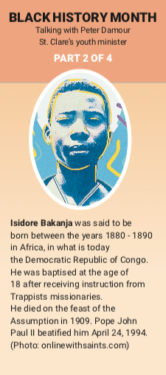Part 2 of 4
We will never meet Blessed Isidore Bakanja on this side of heaven. But if you’re looking for a holy friend who might know a thing or two about forgiveness, look no further than Bakanja to intercede on your behalf.
For simply speaking about his faith to others at his job, reciting the rosary, praying or wearing his brown scapular, the young man from Africa was flogged with a leather whip infused with nails. More than 100 lashes ripped the skin on his back, nearly exposing the young man’s bones. He was nearly brought to the point of death by his employer — an atheist, anti-Catholic owner of a rubber plantation in Congo.
When an inspector came to the plantation, Bakanja was sent to another village but managed to hide in the forest where he approached the inspector, by nearly dragging himself to the man.
“If you see my mother, or if you go to the judge, or if you meet a priest, tell them that I am dying because I am a Christian,” he said. After six months of prayer and suffering — including forgiving his former employer — Bakanja died, and was said to have a rosary in hand and a scapular around his neck. Pope John Paul II beatified him in 1994.
“To the black Catholic community, it serves as a reminder that not only are we targeted because of our skin color but we, too, can be targeted because of our faith,” Damour said.
He continued, “We share in that same cross. The cross that Isidore, Felicity and Perpetua all faced. We are even reminded today that our faith can be the reason in which we are killed. We can’t forget those who are being persecuted in Nigeria and other parts of the world. It’s the black Catholic community’s hope and prayer that we shall indeed overcome.
“Isidore’s story also serves as proof that blacks have always contributed to the life and work of the church. These great saints and holy people were not afraid to profess that Jesus Christ is the Lord.”

